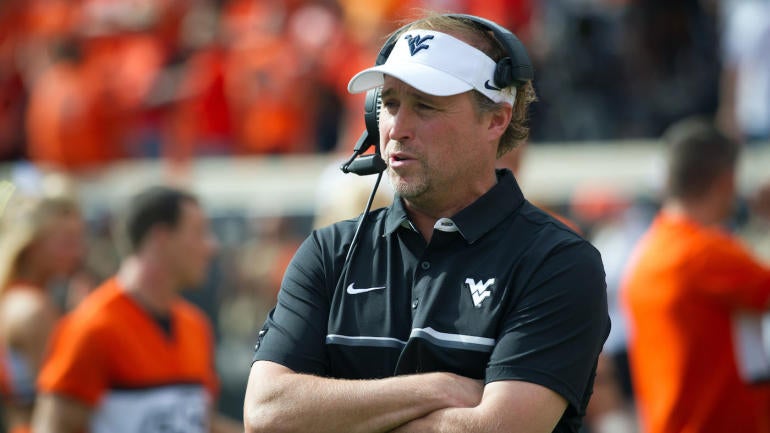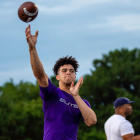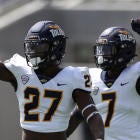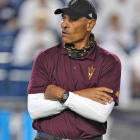
Following multiple reports over the weekend, Houston officially announced on Wednesday that it has hired Dana Holgorsen.
The now-former West Virginia coach of eight years was a top candidate for the job that opened when Major Applewhite was dismissed Sunday after two seasons with the Cougars, will sign a five-year deal worth $20 million, according to The Athletic's Bruce Feldman and SB Nation's Steven Godfrey, who first reported the agreement. That would make him the highest-paid coach outside a Power Five conference ever, earning $1.4 million more than Mike Norvell did at Memphis in 2018 ($2.6 million). However, official details of Holgorsen's contract have not yet been officially released. Holgorsen was paid $3.7 million in salary this past season at West Virginia.
Y’all want to go win some games?
— Houston Football (@UHCougarFB) January 2, 2019
Let’s go win some games!
Help us welcome Coach Dana Holgorsen to H-Town! #GoCoogs pic.twitter.com/rhZyjtc5xL
Holgorsen is 61-41 in his time at WVU and has led the program for its entire Big 12 tenure; the Mountaineers joined the conference in 2012. West Virginia generally hovered between 7-8 wins under Holgorsen, though it posted a 10-3 campaign in 2016 that netted a second-place finish in the Big 12. Holgorsen previously served as offensive coordinator at Houston under Kevin Sumlin from 2008-09.
Here's what you should know about the hire and what it means for Houston, Holgorsen and West Virginia ...
This is a good move for both parties. I've long held the belief that 2018 would be Holgorsen's last season at West Virginia for one reason or another. He's been there eight years, which in today's coaching world is an eternity. Only the legendary Don Nehlen won more games in Morgantown. Holgorsen, who is indisputably a brilliant offensive mind, is a fan of the Houston area. Having worked there in the past as a coordinator, he'll fit right in. Framing this move as a step down from the Power Five to Group of Five is missing the point; Holgorsen is going from a remote location that produces few Division I recruits and forces him to cast a wider net to freaking Houston. Texas, and Houston in particular, may be heavily mined for recruits, but Holgorsen will have a much easier time getting locally sourced high school players there -- especially quarterbacks.
That being said, Holgorsen was not without his shortcomings, a list of which would get away from the big picture. The reality is this team was Holgorsen's best team and he went 8-3 in the regular season, dropping his final two games vs. Oklahoma State and Oklahoma, the former of which was an absolute gut punch for the program's Big 12 Championship Game hopes. This past season always had a "if not now, then when?" vibe to it and the Mountaineers came up short. Holgorsen won 10 games twice, one of which came in his inaugural season. Granted, West Virginia can be a tough place to win, but failing to maximize its small window for something great put a lot of stress on this partnership. It was time for both sides to move on, especially with an obvious rebuild ahead.
However, Holgorsen isn't escaping pressure, he's arriving for another round of it. The only thing Holgorsen bought with this move is more time. Had he returned to West Virginia in 2019 without a contract extension, which was extremely likely if he did return, Holgorsen maybe would have survived another year or two barring a pleasant surprise. Athletic director Shane Lyons did not hire Holgorsen and given the disappointment of this past season was understandably not incentivized to reward him.
Houston was incentivized and that's great for Holgorsen, but by no means does this make his job easier. The university's president quite literally said in 2016 that the school would fire coaches for going 8-4. That's exactly what Holgorsen did in 2018 and his 15-10 record in the past two seasons is identical to Applewhite's record in two full seasons with the Cougars. And Houston is paying Holgorsen way more money than it did for Applewhite. This may be a good fit for Holgorsen, but a job is only as good as its bosses and Houston has high expectations for him with a trigger finger to boot.
Where does West Virginia look next? No, it's not Rich Rodriguez. It's not Butch Jones, either. West Virginia may not be an amazing job, but it doesn't need to hire a retread who left unceremoniously 11 years ago, nor a former assistant who drove Tennessee into the ground. It can do better and there are good enough candidates out there to not have to seriously consider either. So to whom should Lyons look?
A statement from Director of Athletics @WVUADLyons on the current coaching search. #HailWV pic.twitter.com/8k0Bw55MIT
— West Virginia Football (@WVUfootball) January 2, 2019
- Washington State coach Mike Leach: As with almost any No. 1 choice, the ranking is not based in realism as much as it is forcing him to tell you "no." We're not talking about Jimbo Fisher or Nick Saban, two of West Virginia's favorite sons, here. Leach works well in off the grid spots and he's a proven winner. See if he's interested. Why not?
- Cincinnati coach Luke Fickell. The connections to WVU (and former Ohio State) president E. Gordon Gee is what makes this the strongest possible match, but give Fickell credit for taking the Bearcats out of the cellar and making them an AAC East contender in just two years. He's recruited well, too, which given his Ohio roots, would be beneficial at West Virginia.
- Troy coach Neal Brown. He's had three straight 10-win seasons at Troy and somehow he's still there! Somebody go hire him!
- Wake Forest coach Dave Clawson: He's a proven program builder at four different schools, many of which have their own set of challenges. While being seven games under .500 at Wake isn't a great selling point, he MacGyvered the injury-plagued Deacs to a bowl game this year with a stapler, a rubber band and a little ingenuity. Plus, the #Clawfense is fun as hell.
- Army coach Jeff Monken: This is a wild card, which would make it a risky hire and Lyons needs to nail this. I can't think many prominent Power Five boosters would agree to their beloved program running the triple option, but what Monken has done at Army -- he's 29-10 in the past three seasons -- is tough to ignore. (Also, see: Oklahoma 28, Army 21.) At a Big 12 outlier, going with something completely different may not be a terrible thing.





















